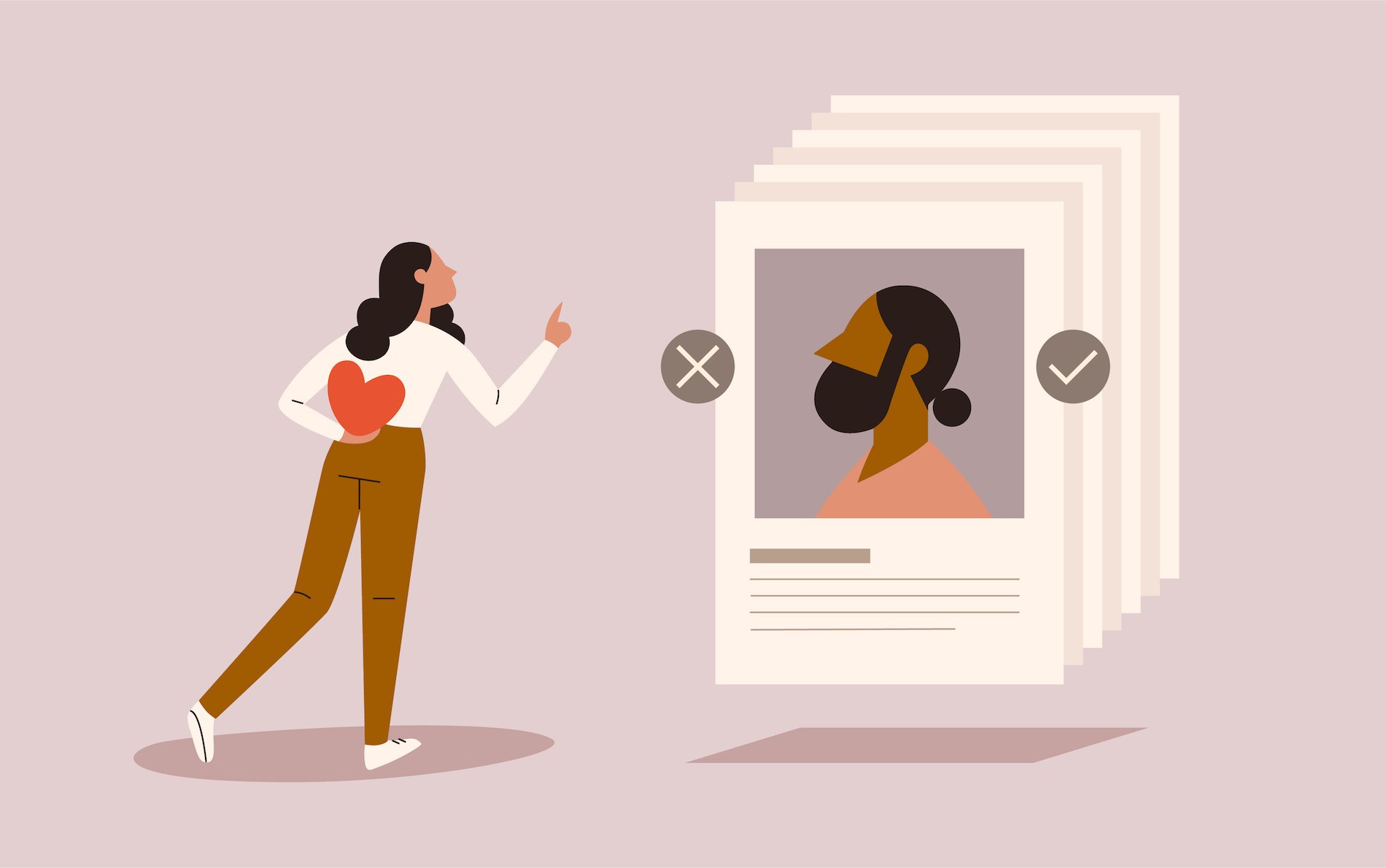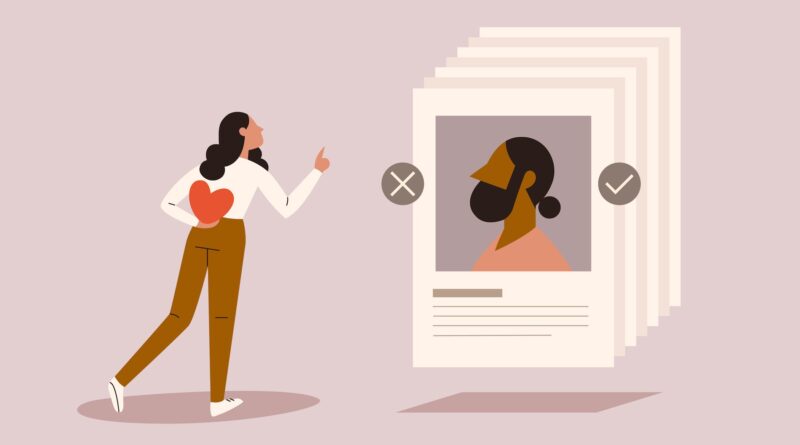Dating culture has become selfish. How do we fix it?

If you’re single and extremely online, you’ll have noticed a particular disdain for dating right now, especially when it comes to dating apps. More specifically, you’ll have noticed that everyone is being the absolute worst.
Ask around and all the daters you know will likely echo sentiments of dating becoming a chore and matches exhibiting more rude, dismissive, and even abusive behaviour than ever. Social media is flooded with stories of dating app matches treating potential partners as prizes, and of ghosting, being love bombed, breadcrumbed, getting stood up, left on read, even a date bringing two matches to a date at once without their consent.
It’s having a profound effect on our feelings towards dating, leaving a lot of us feeling insecure, and worried that love might not happen for us. Essentially, we’ve entered an era of selfish dating. It feels like everyone opening the apps is doing so with an “every man for himself attitude” and we’re looking for ways to boost ourselves rather than foster genuine connections.
We’ve entered an era of selfish dating…
But why is everyone being so awful? Speaking to experts in the field of love and sex, Mashable uncovers why so many people are struggling with this, and how on earth we can fix it.
The dating ‘grindset’
It seems we’re all behaving inappropriately when it comes to dating right now, but none of us quite understand why, or how to stop. Katherine Angel, academic and author of Tomorrow Sex Will Be Good Again: Women and Desire in the Age of Consent, says a big part of rising selfish behaviour in dating is looking at dating as economic and treating it as either an investment or waste of our time.
Take this Reddit post for instance which went viral back in July, where a man asked a woman out for ice cream and she took that as a red flag, deeming it childish, and ended their connection abruptly. Or, you might take the viral TikTok which dominated headlines, wherein a woman invoiced dates for the time she wasted on them.
Angel says viewing dating, even when it doesn’t work out, as a waste of time is a “sinister way to look at life” but we’re all doing it because it’s encouraged by capitalism.
“The modern capitalist system we all exist under wants us to optimise our time as much as possible so we have a money-making mindset, which benefits the economy,” she explains. This ideology values quick success over the slow-burning kind, and we’re applying that thinking to our dating lives as well as our work.
The modern capitalist system we all exist under wants us to optimise our time as much as possible so we have a money-making mindset, which benefits the economy.
Treating someone to have wasted your time, whether you invoice them, berate them, or internalise the feeling, implies to Angel that you’re looking at your dating life as work.
She explains that this is an “economic model of human relations that many of us have started to view our lives through by default.”
Angel notes looking at relationships in this economic way is part of the toxic self improvement movement that’s been on the rise, the “grindset,” if you will.
We’re often overwhelmed by content online, wherein people are stuck in a perpetual cycle of self-analysis, improvement, and repeat, and they influence others to fall into the trap with them.
Dating apps unfortunately suit this window shopping mentality for finding connections.
Angel notes that vulnerability, which is needed for fostering romantic connections, isn’t really encouraged on dating apps because we can switch off as soon as we’re uncomfortable, or as soon as we see something we don’t like or say something cruel without thinking about the impact it might have on the other person.
She says dating apps have the irony of feeling very public, but actually being too private. “You’re not getting outside of yourself enough. You’re encountering the apps kind of on your own, locked into your own experience.”
She adds, “There’s this illusion of ease and less friction [that comes with dating apps] and maybe it does make it easier for us to meet people and it may be sexually fulfilling too but you have to be out of your comfort zone to make connections. It’s not supposed to be easy.”
Increasingly, Angel finds herself becoming more sceptical of online dating as a good way to meet people, adding that what we’ve essentially done with our dating lives is made ourselves products and the vehicles of dating app companies’ profits. So, no wonder we’re behaving like capitalists when dating — even offline.
‘Me’ Culture
Dating apps are not responsible for this specific selfishness, though. Rather, they are a symptom of a wider culture problem.
This economic thinking Angel challenges has created an innate selfish culture in dating, especially between heterosexual men and women — who most of the dating complaints seem to come from.
Many of us are heading to connections with a “me first” attitude, which Jessica Alderson, a dating expert at dating app So Synced, says is iterated by viral trends on social media like the “dump him” trend which treat humans like collectable (and disposable) commodities.
We’ve also reached a point where descriptions like “high value men/women” applied to the people we match with in the dating pool have achieved virality repeatedly and have entered the cultural lexicon in a sincere way. We’re talking about each other, even and especially romantically, like commodities.
Alderson says there’s nothing wrong with putting yourself first in dating, and “we are all responsible for protecting our own energy and well-being and we are the only ones who truly know our own needs and boundaries.”
But somewhere along this self-prioritisation became straight-up selfishness. Hooks argues in All About Love that capitalism and patriarchy, the latter being a product of the former, have created a “me culture,” in society, a mass hyper-individualism that looks an awful lot like narcissism… but is under the guise of self-care or protection of personal safety.
Alderson adds that this “me culture” has been exacerbated by social media. “For many people, Instagram, TikTok, and YouTube are their primary sources of information for navigating the complex world of modern relationships. Social media users are now exposed to curated and often unrealistic portrayals of dating expectations, and this has perpetuated a distorted perception of what a “successful” dating experience should look like,” she says.
She adds that specific dating “standards” and “rules,” such as only going on a second date if a certain amount of money is spent on the first or only sleeping with broke guys and saving dating for rich men, are publicised by viral content that promotes unrealistic and unhealthy rules for dating. This kind of mindset in dating has, in turn, left a lot of people with ridiculously rigid and specific criteria for their ideal partners — something no one can realistically achieve.
Alderson explains, “Of course, we should always be mindful of our own needs and boundaries when dating, but it’s important to question where our expectations are coming from and whether they align with our personal values.”
There’s nothing wrong with putting ourselves first, but only thinking of yourself, treating people as interchangeable or disposable items or expecting romantic partnerships to involve endless joy and abandoning anyone who doesn’t fit your personal criteria 100 percent of the time as though they’re a faulty product. You are not really putting yourself first if no one is second.
And when you’re on the receiving end of that kind of “me” obsession, it’s deflating, upsetting, and even heartbreaking. No wonder that 1 in 4 people feel unworthy of a partner, according to Bumble.
When self protection becomes self sabotage
It’s particularly interesting that the majority of dating woes are coming from heterosexual daters, as Angel notes our gender roles (cultural scripts the sexes are supposed to follow such as acting masculine or feminine, going to work vs doing the housework, and being heterosexual) have an affect on our dating fears.
A quick scroll through Reddit and the myriad opinion pieces, YouTube videos and podcasts complaining about dating from straight people right now, point to an uptick in selfish dating from women specifically.
Think dumping men over their salaries, insisting that men should always pay the bill, and expecting to be treated like nothing short of a princess (and needing proof of capabilities to provide it) before agreeing to leave the house to meet with men.
The incels, alpha males and “men’s rights activists” of the internet would have you believe this is “feminism gone mad” and that dating is currently easier for women, but there’s more to it.
Angel argues that in a post-Me Too era, many women are going into dating guarded, worried about what they could possibly endure from men. After all, at least 57 percent of women have experienced sexual harassment on dating apps.
“Whenever you see people acting in unreasonable or cruel ways, chances are they’re frightened of something,” Angel explains. This plays into our scripted gender roles as men are raised to fear humiliation and act violently to avoid it. In turn, women learn to protect men from humiliation by not upsetting or rejecting them.
“Women have been treated very badly by men in the dating realm,” Angel says. “It makes perfect sense that a lot of women go into the dating scene now feeling vulnerable. There is a risk of unpleasant behaviour at best and bullying, harassment, coercion, manipulation or even assault at worst,” she adds.
For men, they may fear rejection or humiliation and, as a defence mechanism, strike with selfishness before they are hit with it themselves.
Angel notes that these fears are completely valid and fair, but they ultimately hold us back. This is where what we mistake as “self care” or “self preservation” actually becomes self sabotage. And to outsiders, it just looks plain selfish.
In All About Love, bell hooks tells us that “love cannot coexist with neglect, nor with fear” but that there’s a “falsehood that love or intimacy can be acquired without risk.”
Angel says this is the human dilemma of dating. “If we want to encounter pleasure through our interactions with others, we risk getting hurt,” Angel says.
It’s time to radically rethink how we approach dating. We’re encapsulated in a system that gives us uncomfortable scripts, and we’re lashing out at each other, becoming too insular, scared, competitive and, yeah, selfish, to properly connect. But as all-consuming as capitalism might seem, systems are merely systems. They’re not truly real. We have the means to remove capitalist thinking from our own immediate networks, including the dating pool, just by simply treating people as people, not commodities.
Confronting that this influence is happening is the first step to rethinking the way we think about prospective partners, and fixing how we approach them, and how we’ll hopefully, eventually, love them. All we want is more care and more love. To receive that, we have to be giving it too.


